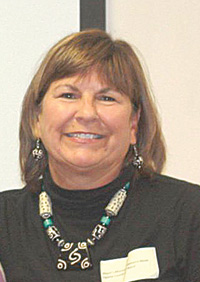Keep It Real Pioneer Marianne Blodgett Retires
 When Marianne Blodgett retired in September as Chairperson of the Mayor’s Alliance on Substance Abuse, she left behind a legacy that will impact the children of the Bluegrass for years to come.
When Marianne Blodgett retired in September as Chairperson of the Mayor’s Alliance on Substance Abuse, she left behind a legacy that will impact the children of the Bluegrass for years to come.
Hired by the Urban County Government in 1978, Blodgett has spearheaded numerous efforts to benefit youth.
When the Champions vs. Drugs campaign combined with the Committee on Substance Abuse to form the Mayor’s Alliance on Substance Abuse,Blodgett took on the challenge as chairperson to raise awareness about substance abuse.
“We were all about awareness,” she said. “We held parades, 5K runs, Red Ribbon Week and candlelight vigils.”
But by 1990, she and Donna Wiesenhahn from Bluegrass Mental Health and Mental Retardation agreed to switch the focus to science-based programs that could show measurable results.
The new effort began to attract more supporters, including counselors, nurses, and representatives from insurance companies, liquor stores, the state police, UK, the health department and Fayette County Public Schools.
Wiesenhahn credits Blodgett with bringing the group together.
“She consistently found ways to connect people together and that made a huge difference. It got people on board,” she said.
In 2004, Blodgett used those connector skills to form a new group, which initiated the Keep It Real – Don’t Drink effort, which is a com-munity-wide campaign to raise awareness of the dangers of underage drinking.
Blodgett reached out to community resources such as Arthur Rouse of Video Editing Services, Topsy Staten of UK, Doug Gabbert of Preston-Osborne, and John Lynch of Lexington Family Magazine.
The focus of the program became the innovative Keep It Real video contest that asks high school students to create 30-second commercials promoting the anti-underage drinking message.
The program was an immediate hit, with 30 videos entered in the first year. “We were so pumped,” Blodgett said.
The program has continued to be a hit — last year 72 Central Kentucky students entered videos.
Blodgett credits the contest’s popularity to many factors – it is gender neutral, appealing to boys and girls; it offers a creative component; and it offers teens a chance to create campaigns directed at their peers.
“This is the program I am most proud of,” Blodgett said. “It involves hundreds of kids working on these projects. “I don’t ever remember a program that had more appeal for young people.”

